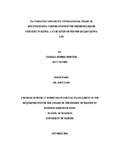| dc.description.abstract | The purpose of this was to establish the factors that influence international trade of
multinational corporations in the premium liquor industry in Kenya: a case study of Pernod
Ricard Kenya Ltd. The value of this study was to help the players in this industry
understand better those factors that influence international trade in the premium liquor
industry. These players can be both local and international players. They would be able to
know those factors that affect them from social, economic, legal, political and
technological angle. The study was anchored on the international trade theories such as
the mercantilism, absolute advantage, country similarity theory, product life cycle theory
and current dominant trade theory.The study adopted a non-technical, exploratory
approach that combined both qualitative and quantitative tools. The target population were
48 staff of Pernod Ricard Kenya Ltd through a census sampling. Questionnaires were the
source of primary data and the study employed exploratory data analysis and presented in
frequencies, percentage, means and standard deviations using tables.The study concludes
that the political factors influencing international trade of Pernod Ricard Kenya Ltd are the
threat of terrorism, the dynamic political environment, the interaction between the
organization and other international bodies/nations and political instability. Among the
legal factors were the legal barriers between various countries, restrictive laws, lack of
supportive legal systems and the high taxation rates. The study further found that the
economic factors were the high rate of competition, the cost of buying premium liquor and
finally the amount of income extracted from the international markets. The socio-cultural
factors were the religious disparities between the market structures, the different cultural
practices across the global players, the religious believes between the players at the
international market and the drinking occasions across the market. The environmental
factors were the process of customs clearance, the ability of the organization to access
business permit, the presence of a friendly business environment and the rampant cases of
corruption. Key conclusions are that threat of terrorism, too many legal requirements,
lengthy customs clearance processes, religious disparities and very high competition
influence IT. Recommendations include the government working to ensure systems
support IT. Security is controlled to avert terrorism and promote fair competition practices. | en_US |



